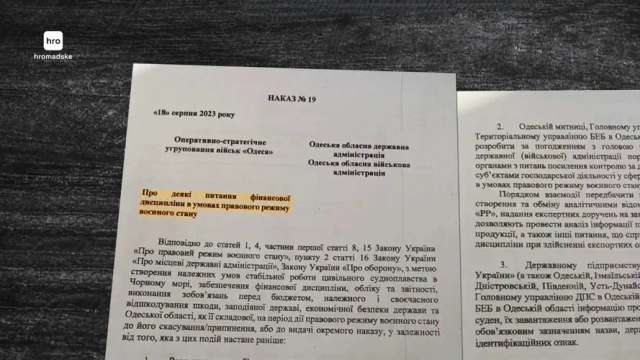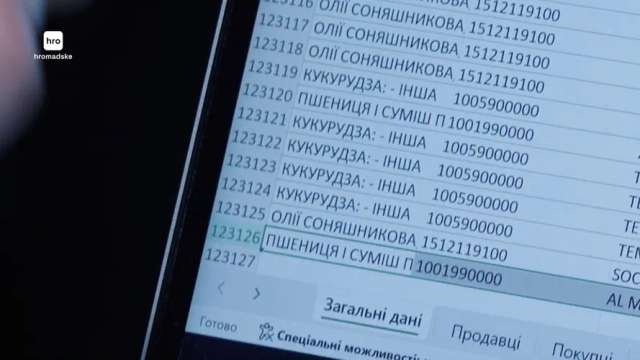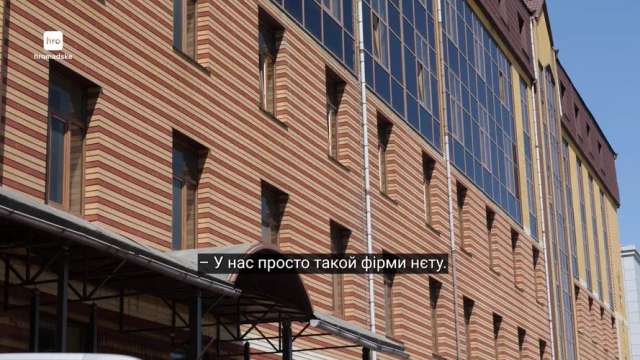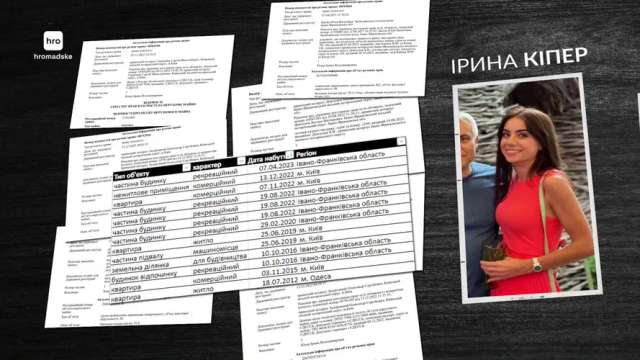Олег Кипер взял под ручной контроль 85% агроэкспорта Украины
Более миллиарда долларов в месяц — именно столько получали украинские экспортеры зерна в 2023 году. За это время из Украины экспортировали не менее 50 миллионов тонн разнообразной сельскохозяйственной продукции на 12 миллиардов долларов.
Расследователи hromadske обработали огромный массив информации из международного сервиса торговых баз данных ImportGenius и узнали много интересного.
Крупнейшими экспортерами зерна стали компании Кернел трейд, Нибулон и Луи Дрейфус — огромные холдинги, которые традиционно доминируют на украинском агрорынке. Крупнейшие покупатели украинского зерна — Румыния, Испания и Китай.
Польша, где фермеры так активно протестовали якобы из-за переполненности рынка дешевым украинским зерном, — аж на восьмом месте.
Но и первое место Румынии — тоже иллюзия. Агрохолдинги продавали зерно в Румынию собственным дочерним компаниям, а куда его перепродавали дальше — с украинской таможни не видно.
Зато видно, кто вывозил зерно через одесские порты. Так, сорок подозрительных компаний (предположительно, фиктивных) вывезли через порты Одессы зерна на шесть миллиардов гривен. Только зерно куплено за наличные, а все эти миллиарды гривен остаются за пределами налогообложения.
Как одному украинскому чиновнику удалось взять под личный контроль почти весь аграрный экспорт Украины
Уникальные таможенные правила
Из-за войны у Украины не осталось других путей экспорта зерна морем, кроме как через Одессу. Поэтому сейчас это главный путь для продажи украинской агропродукции за границу.
Например, из 16 миллионов тонн пшеницы, которые продали из Украины за границу в 2023 году, 13 миллионов 700 тысяч вывезли именно морем, то есть через Одессу. Это 85%. Примерно такое же соотношение было и по ячменю, кукурузе и тому подобное.
Поэтому человек, который управляет потоками зерна в Одесской области, контролирует почти весь зерновой экспорт Украины. И это — председатель Одесской областной военной администрации Олег Кипер.
Во времена Януковича Олег Кипер работал заместителем руководителя следственного управления Генеральной прокуратуры, а затем был люстрирован и лишен права занимать государственные должности на 10 лет. Но в 2019-м известный Окружной административный суд города Киева отменил люстрацию Кипера.
В июле 2020-го его назначили на должность прокурора города Киева. Журналисты «Схем» выяснили, что после начала большой войны Олег Кипер, находясь на должности, провел новогодний отпуск за границей. Он выехал из Украины 29 декабря 2022 года и вернулся 8 января 2023 года. Журналистам Кипер объяснил это «семейными обстоятельствами».
Незадолго до назначения в Одесскую область Кипер попал в еще один скандал — из-за российского паспорта жены, Ирины Кипер. Сам чиновник утверждал, что она избавилась от российского гражданства и получила украинское в июле 2022 года. А впрочем, журналисты доказали, что российский паспорт жены Олега Кипера оставался действующим еще в феврале 2023 года.
Вы можете спросить: а какое отношение глава областной администрации имеет к экспорту зерна? Это же не его полномочия. А вот и нет. То есть, конечно, глава ОГА не должен контролировать экспорт, но во время полномасштабного вторжения в Украину появилось много доселе неизвестных механизмов.
18 августа 2023 года глава Одесской областной военной администрации Олег Кипер и тогдашний командующий Оперативно-стратегической группировки войск «Одесса», генерал Эдуард Москалев издали совместный приказ «О некоторых вопросах финансовой дисциплины в условиях военного положения». Как обычно в таких случаях, его необходимость объясняли интересами прозрачности и борьбы с теневыми явлениями.

Но о чем на самом деле был этот приказ №19? Первым пунктом предпринимателям рекомендовали: «Подавать одесской таможне таможенные декларации типа РР за 10 календарных дней до даты фактической погрузки груза. На день подачи декларации типа РР все таможенные накладные по товару, который фактически будет погружен, должны быть зарегистрированы».
Сложно? Расшифровываем.
Таможенная декларация с буквенным кодом «РР» — это так называемая периодическая декларация. Если у вас есть большой зарубежный контракт и вам надо будет вывезти несколько партий товара в течение определенного периода, вы подаете на это время эту самую «периодическую декларацию».
То есть вот столько товара по такому-то контракту я планирую вывезти из Украины в течение вот такого-то времени. По этой декларации вы вывозите свой товар, а потом обязаны отдельно подробно отчитаться обо всех операциях и уплатить налоги с доходов.
Но в законодательстве никогда не было требования подавать такую декларацию за десять дней до вывоза. Так что на самом деле Олег Кипер ввел на территории Одесской области собственные таможенные правила, отличные от остальной территории Украины.
В ответ сразу несколько украинских объединений зернотрейдеров выступили с публичным требованием отменить приказ. Среди таких — Украинская зерновая ассоциация и Украинский клуб аграрного бизнеса. Требование они мотивировали тем, что приказ не является нормативно-правовым актом и не является частью ни таможенного, ни налогового законодательства.
«С началом полномасштабного вторжения у нас существенно вырос объем экспорта так называемого черного зерна. Суть проста: во-первых, перестали возмещать НДС, во-вторых, если помните, разница в курсах валют в начале вторжения была огромная — по 20% между тем, что давал Нацбанк, и тем, что вы видели в обменнике.
Легальные экспортеры теряли 35%, если сравнивать с так называемыми черными контрагентами, которые покупали зерно за наличные. Последним не надо было возмещать НДС, потому что они его не платили. Везли зерно за границу и валютную выручку потом не возвращали, просто эта компания-однодневка в Украине умирала.
Справедливо будет заметить, что летом-осенью 2022 года действительно был расцвет этого теневого экспорта. Так что инициатива борьбы с теневым экспортом в целом была нужна. Но дьявол, как всегда, в деталях.
Проблема приказа Кипера в том, что любая подобная система контроля — это полный «ручник». Я не могу кого-то обвинять, у меня просто нет фактов, но мы понимаем, что в нашей стране ручной контроль создает повышенные риски коррупции», — говорит Дмитрий Кохан из союза „Аграрная рада“.

Имели ли жалобы какой-то результат? Никакого.
«На следующий день после введения приказа, когда уже начались определенные процессы и начали отрабатывать определенные механизмы, которые мы ввели, пошло очень много жалоб. Все зерновые ассоциации почему-то начали на нас жаловаться. Мы это перетерпели. Если раньше была огромная дыра [для «черного экспорта» на границе], то сейчас остается только маленькое горлышко», — вот как тогда Олег Кипер объяснял причины введения приказа.
Из этого можно сделать вывод, что замысел был направлен на борьбу с нелегальным экспортом зерна, купленного за наличные. Мол, недобросовестные компании-однодневки регистрировали периодические таможенные декларации наперед, вывозили по ним сотни тысяч тонн зерна, а когда наступало время платить налоги, они просто исчезали. Оказывалось, что директором там был бездомный, все контакты в реестре — липовые, а платить налоги — некому.
«Горлышко» Кипера
Чтобы понять, что происходило с зерном в одесских портах, нам пришлось обработать огромный объем информации. Американская база таможенных данных ImportGenius среди прочего предоставляет информацию обо всех экспортно-импортных операциях в Украине с 2011 года. То есть это официальный и верифицированный источник информации.
Агроэкспорт за 2023 год — это более 120 тысяч операций только по самым популярным видам продукции. Мы перебрали все записи вручную, чтобы найти все компании, которые вышли на рынок после 20 августа 2023 года.

Всего после приказа №19 на рынок вышли 400 новых компаний. Часть из них входит в известные агрохолдинги, часть — реальные агропредприятия со своими гектарами и комбайнами, часть — имела успешную историю экспорта за предыдущие годы.
Наше внимание привлекли компании с признаками фиктивности: те, которые впервые вышли на рынок в 2023-м, не имеют производственных мощностей и принадлежат непонятно кому. Мы обнаружили около сорока однотипных подозрительных компаний.
Все они были зарегистрированы или сменили владельцев в 2023 году и появились на рынке после издания упомянутого приказа. Эти компании не входят в известные агрохолдинги, не имеют собственной земли и никогда ранее не занимались экспортом.
Мы попытались выборочно связаться с руководителями этих компаний, но по телефонным номерам либо не отвечали, либо были вне зоны. И это неудивительно.
Крупнейшая из этих компаний, которая вывезла зерна на 40 миллионов долларов, согласно данным системы YouControl, имеет такой же номер телефона, как и еще 139 юридических лиц.
Второе место с результатом в 20 миллионов долларов заняла компания, основателем которой, как представляется, является психолог из Узбекистана Александр Райков. Вот как он выиграл в 2012 году.

Журналисты попытались найти офис этой компании в Киеве. Она зарегистрирована по адресу ул. Владимира Сосюры, 6, без уточнения номера офиса.
Оказалось, что это большой бизнес-центр, где работают десятки организаций. Охрана бизнес-центра заверила, что такой компании в здании нет и не было — ни по новому, ни по старому названию.

Ранее компания называлась МЕНТИ. С августа по декабрь 2023 года она вывезла из Украины 30 тысяч тонн подсолнечного масла на 20 миллионов долларов. В конце года компания сменила владельцев, адрес, название. Теперь это ТЕЛМЕНС, а единственным учредителем стал гражданин Узбекистана Александр Вадимович Райков из Ташкента.
Там действительно существует человек с такой фамилией, именем и отчеством. Это психолог, который некоторое время работал, а раньше учился в местном филиале Московского университета имени Ломоносова. Всего за 2022 и 2023 годы на него в Украине зарегистрировали 20 юридических лиц.
Все это вместе и называется «признаками фиктивности». Неудивительно, что эта конкретная компания уже фигурирует в нескольких уголовных производствах.
Подобные компании с признаками фиктивности вывезли из Украины через Одесскую область 800 тысяч тонн зерна на более чем 150 миллионов долларов. Это шесть миллиардов гривен!
По данным нашего источника из Одесской таможни, по меньшей мере несколько компаний из нашего перечня подозрительных принадлежат, так сказать, «к сфере влияния» самого Олега Кипера. Если это действительно так, это могло бы означать, что председатель ОГА взял под личный контроль 85% агроэкспорта Украины ради личной выгоды.
Журналисты обратились за комментарием Олега Кипера. Впрочем, наш официальный запрос пока остался без ответа.
Бизнес в Буковеле по закрытой декларации
Обогатился ли Олег Кипер на госслужбе?
Как утверждали наши коллеги из Центра публичных расследований, Национальное агентство по вопросам предотвращения коррупции засекретило декларации руководителя Одесской ОГА за 2021-2023 годы.
Нет его деклараций и в публичной части реестра НАПК. Но Министерство юстиции, которое руководит Государственным реестром прав на недвижимое имущество, собственности Олега Кипера не скрывает.
По этим данным, большую часть своей недвижимости Кипер приобрел еще до большой войны. Это квартира в Киеве и дом для отдыха в Киевской области. В 2023 году глава Одесской области получил в наследство большой сельскохозяйственный участок в Одесской области.
По-настоящему впечатляет перечень имущества жены — Ирины Кипер. Это 13 объектов недвижимости общей стоимостью до миллиона долларов. Половину из этих объектов Ирина Кипер зарегистрировала уже после начала российского вторжения. Так, она купила два помещения в Киеве под магазины, которые сдает в аренду.

Война не помешала ей развивать свою элитную базу отдыха в Буковеле — самый дешевый номер там сейчас стоит более 5 тысяч гривен за ночь, а отдельную виллу можно снять за 16 тысяч в сутки.
К слову, партнером Ирины Кипер в Буковеле оказался Василий Кавлак. Сейчас он строит в Буковеле крупнейший в Украине апарт-отель на 800 номеров. Это вдвое больше, чем в нынешнем крупнейшем отеле страны, — «Русь» в Киеве имеет всего четыреста номеров.
То, что семейный бизнес Кипера получил мощный толчок для развития в условиях войны, пока компании-однодневки вывезли из Украины почти миллион тонн продукции на 6 миллиардов гривен, может быть лишь совпадением. Вопрос в том, верите ли вы в такие совпадения. И что думают о них правоохранители.


